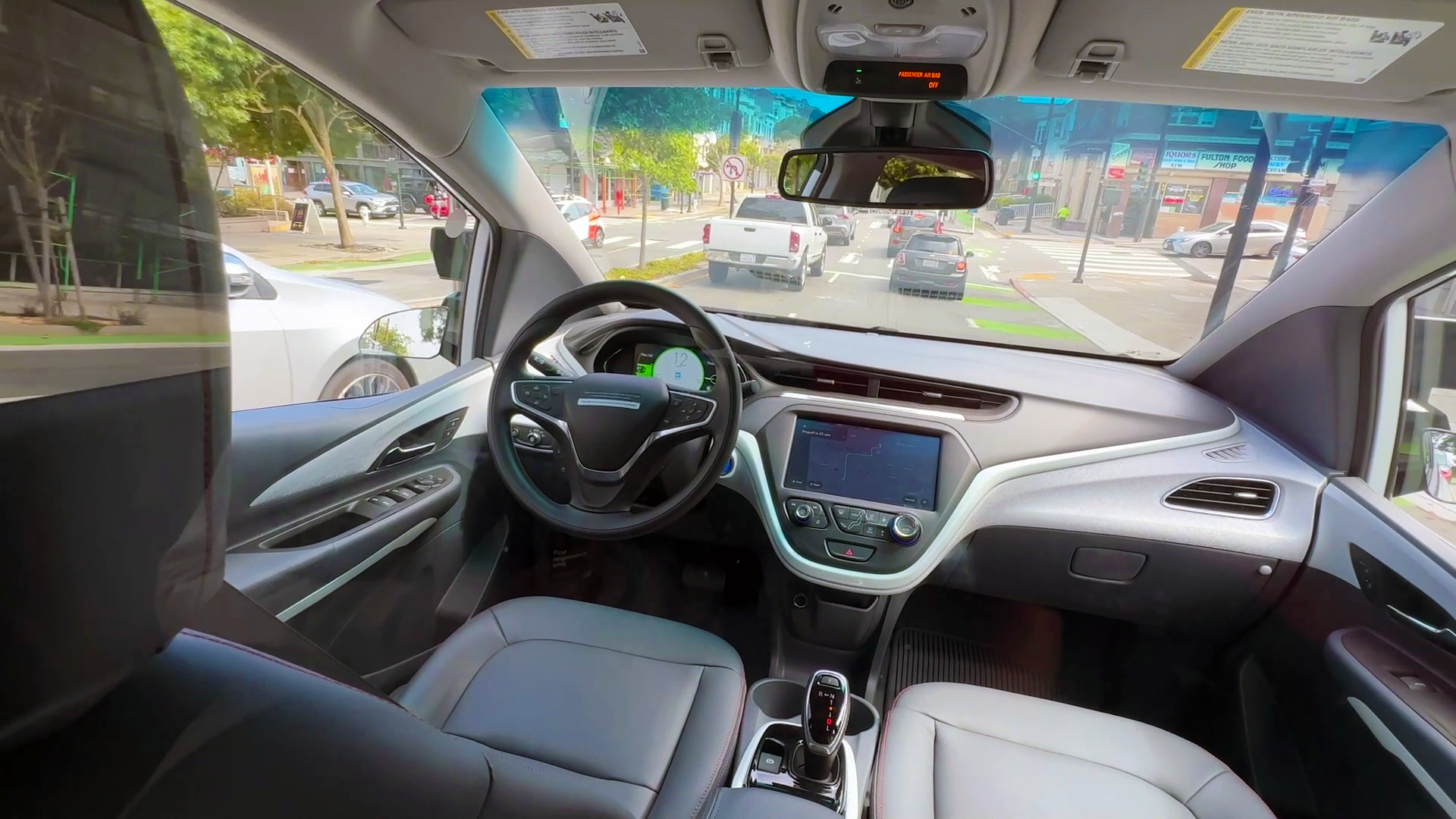In San Francisco, one of the nation’s largest testing grounds for driverless vehicles, school crossing guards say they have had to rush out of crosswalks to avoid being hit by self-driving cars.
“I just don’t think it’s very safe,” said Theresa Dorn, a school crossing guard of 11 years. Dorn says driverless vehicles operated by Google’s sister company, Waymo, have nearly struck her on three separate occasions over the past year while she was guiding children and their families along crosswalks.
The parent grabbed the child and looked at the car --
Theresa Dorn, San Francisco crossing guard recounts one of her near misses with a driverless car
there was nobody driving it.
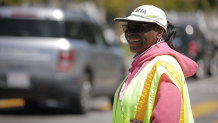
“The parent grabbed the child, looked at the car, and there was nobody driving it,” she said.
To learn more about the potential safety concerns, the NBC Bay Area Investigative Unit interviewed 30 crossing guards stationed at more than 20 schools across San Francisco. Nearly 25%, about one in every four, told the Investigative Unit they experienced some type of “close call” in the crosswalk with a Waymo driverless car, where either the vehicle suddenly hit the brakes to prevent a collision, or the crossing guard rushed out of the way to avoid being hit.
“It did not recognize me in the intersection,” said Dorn, who added that each of her near misses occurred while she was holding up her stop sign in the crosswalk.
“Why do they have these driverless cars?” she said. “I think somebody should be driving them.”
Crossing guards describe "close calls"
Get a weekly recap of the latest San Francisco Bay Area housing news. Sign up for NBC Bay Area’s Housing Deconstructed newsletter.
Of the 30 crossing guards interviewed by NBC Bay Area, all but Dorn spoke on the condition of anonymity since they did have permission from their employer to speak publicly.
A total of seven San Francisco crossing guards, including Dorn, described a near-miss encounter involving a Waymo autonomous vehicle.
“I’ve almost been hit half a dozen times,” one crossing guard told us.
“I tell kids to stay back,” said another.
The majority of crossing guards who spoke with NBC Bay Area, however, said they had not encountered a close call with a driverless car. In fact, some said they have consistently found self-driving vehicles to be better drivers than humans.
“I’ve almost been hit by parents, not driverless cars,” one crossing guard said.
Another added, “they stop better than people.”
But even among those crossing guards who didn’t report experiencing any near misses, some said the cars still made them nervous and recounted other types of traffic issues, such as autonomous vehicles blocking lanes or crosswalks for seemingly no reason.
“I hate them,” one crossing guard said, before adding, “but I have more problems with these idiot [human drivers].”
Those who said they encountered a close call with an autonomous vehicle noted they occurred within the past year, although none could remember exact dates or times.
Waymo said without specific details, it couldn’t explain what its cars may have done or why.
The company declined an on-camera interview request from NBC Bay Area, but said in a statement it takes public concerns “very seriously,” adding “while we’re proud of our safety record, we also recognize the importance of ensuring that other road users feel confident and comfortable around our technology.”
In its statement, Waymo also said the “tens of thousands of rides” taken in Waymo vehicles each week are “significantly reducing the number of injuries and police-reported crashes compared to human drivers.”
“We want to be good members of the communities we operate in and appreciate the ongoing dialogue we have with the other road users and regulators,” the statement said.
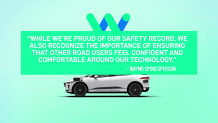
A paper trail of near misses
Calculating the exact number of near misses involving driverless cars is currently impossible because the companies operating them are only legally required by regulators to disclose details on actual collisions. The California Department of Motor Vehicles and the National Highway Traffic Safety Administration (NHTSA) each maintain separate records regarding accidents self-reported by autonomous vehicle companies, however, those databases do not include records involving near misses.
While driverless car companies are allowed to keep their close calls secret, there is a partial paper trail.
NBC Bay Area obtained a database of complaint records submitted to the California Department of Motor Vehicles through a California Public Records Act request.
Last year, the DMV fielded more than 200 complaints, the vast majority of them involving Waymo and its competitor, Cruise, a subsidiary of General Motors.
About 30% of the complaints detailed safety concerns in crosswalks.
“We had to hit the car with our hand,” said one complainant, describing an interaction in a crosswalk with a Cruise autonomous vehicle.
Another person wrote, “We shouldn’t have to be their crash test dummies.”
Cruise, like Waymo, also declined NBC Bay Area’s interview request, but said its cars are “designed to detect, track and predict the behavior of road users, including pedestrians and cyclists," and added it has "a dedicated team that investigates concerns ... and the insights gathered help our [autonomous vehicles] improve."
Cruise also noted that each of its vehicles are “equipped with a 360° field-of-view, radar, and thermal cameras to measure distances to objects and maintain visibility, including at night and during inclement weather.”
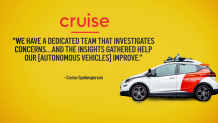
Rules of the road
Vehicles must wait to drive through a crosswalk until all pedestrians are completely out of it, according to the California Highway Patrol. However, in cases where a concrete median separates both directions of traffic, cars are free to pass once pedestrians have cleared that side of the street.
NBC Bay Area’s previous reporting has raised questions about how often driverless cars are complying, including when small children are involved.
Call for more oversight
Some lawmakers in congress and the state capitol are now calling for more stringent reporting requirements from driverless car companies.
“You've identified some pretty discernible patterns,” said U.S. Rep. Kevin Mullin (D-San Mateo), who called NBC Bay Area’s findings “concerning.”
“I will share what you found with my colleagues in Washington to see how we can use this information to keep pressure where we need to apply it.”
You've identified some pretty discernible patterns.
U.S. Rep. Kevin Mullin (D-San Mateo) commenting on NBC Bay Area's findings
In April, Mullin sent a letter to NHTSA formally requesting the agency begin forcing driverless car companies to reveal how often their vehicles are involved in near misses. Current reporting requirements are limited to details only involving actual collisions.
“Those kinds of incidents where people’s lives are put at risk – but it’s not reportable – we need to be looking at those,” Mullin said.
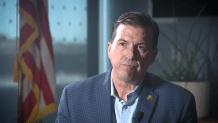
Federal transportation officials with NHTSA told NBC Bay Area it is still in the process of drafting a response to Mullin’s letter and had no comment on the request. The agency, however, did note that it is actively working on six different safety investigations into driverless car companies, including Waymo and Cruise. Both companies have said they are cooperating with the investigations.
“The national data that’s being captured is really limited,” Mullin said. “The data is crucial in crafting regulations that compel these companies to focus on these areas of safety concern.”
While lawmakers, regulators, and driverless car companies continue to weigh in on what future requirements and restrictions should look like for autonomous vehicles, Dorn said she will keep her attention focused on her busy San Francisco intersection and the children she is trying to protect.
“My main concern is just making sure that they get to school safely and that they go back home safely,” Dorn said. “We have to be a little bit more cautious.”
Watch our entire investigative series
- Part 1: Driverless cars seek San Francisco expansion despite worries tech is unsafe
- Part 2: CPUC votes to expand driverless car operations in San Francisco
- Part 3: San Francisco city attorney files motion to pump the brakes on driverless cars
- Part 4: Google's Waymo says insurance data shows its driverless cars are safer than humans
- Part 5: Hit-and-run driver strikes pedestrian, tossing her into path of Cruise car in San Francisco
- Part 6: Driverless trucks and robot deliveries promise fewer traffic jams than robotaxis
- Part 7: Cruise says its robotaxis can now better detect emergency vehicles
- Part 8: California DMV orders Cruise's driverless cars off the road
- Part 9: Driverless cars immune from traffic tickets in California under current laws
- Part 10: GM's Cruise lays off nearly 25% of its workforce
- Part 11: Waymo's driverless cars surpass 7 million miles, but are they safer than human drivers?
- Part 12: Cruise probe blames poor internet, bad leadership, and "flawed" decisions for company's woes
- Part 13: Driverless Cruise car accused of almost hitting 7 yr old after similar close call involving kids
- Part 14: Cruise offers to pay $112,500 in fines to settle claims driverless car company misled regulators
- Part 15: Uber Eats now uses Waymo Self-Driving cars to offer driverless deliveries
- Part 16: Bills aimed at closing traffic ticket loophole for driverless cars get initial green light
- Part 17: School crossing guards say they've had to dodge driverless cars to avoid being hit
Contact The Investigative Unit
submit tips | 1-888-996-TIPS | e-mail Bigad


